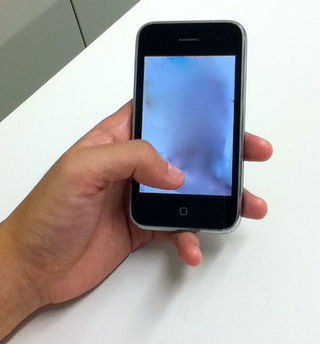Sex
OMG I Accidentally Showed My Therapist a Naked Picture!
Professionals are having to navigate their clients' sexuality in novel ways.
Posted March 7, 2020 Reviewed by Ekua Hagan

Smartphones are ubiquitous in the modern world, and each year, more and more people engage in sexting, sharing and receiving nude pictures. Many men carry nude pictures of their girlfriends or wives, or themselves, on their phones, for personal use, or to show to friends. Many women have nude pictures on their phones, which they may share in dating and on hookup apps.
As smartphones have become such a component of our lives, they've also been increasingly present in the therapy room. Patients use their phones in therapy to take notes on therapy goals, to read or show their therapist a text or social media conversation that is relevant to the therapy, and sometimes to show their therapist pictures.
Just over the past two weeks, I heard about no fewer than four different therapists encountering nude images of their patients. When I reached out to colleagues, I was astounded to hear how frequent and common this is:
"My patient was showing me pictures of his new car because he was so proud and excited about it. We've been working for a long time on his sobriety and helping him to achieve the financial stability to be able to get a loan. He was swiping through the pictures and went too far—the next pic was a 'd*ck pic…' He was mortified. Blushed, stammered, closed his phone. I just laughed and shook my head."
"My client and I were talking about his relationship, and he wanted to show me a picture of his girlfriend. Before I could say I didn't really need to see her, he pulled out his phone and called up pictures of her. One of the pics was her topless. Things got really complicated then, because I recognized her—she's another one of our clients. Now, I've not only seen a naked picture of my client's girlfriend, but I've now seen one of my clients naked, and she doesn't know."
"During my session, my client was talking about work and showed me a picture of his work uniform from the church he works at. He talked about how he is avoiding relationships right now, and then suddenly showed me a picture of this topless woman who works at the church with him and is trying to get him to date her. I asked him to put his phone away, and then we talked about boundaries. He was embarrassed, but I tried to make sure he didn't feel shame about it."
"I've been seeing this patient for about three weeks. I knew he looked familiar, but couldn't really place where I knew him from. Then, I was on Grindr and looking through old conversations and contacts, and I realized that he and I had exchanged pics a few months ago. We never hooked up, and now I'm wondering if he has recognized me or realized. I informed my supervisor about it, and now I'm worried I might get fired or reported to the Board."
"A lot of my clients are sex workers. Sometimes they've shown me pics they sent to their clients as part of their marketing."

"I was working with this older male, who was widowed and recently started dating again after being married for 30 years. He came in really upset one day and showed me the naked pics that he had been sent by women he'd met through dating apps. He was really thrown by how things had changed. It led to a pretty powerful conversation about female sexual empowerment and a chance to challenge his assumptions about such women being 'sluts.'"
"My client was swiping images of his new home, and that's when l was accidentally shown a d*ck pic. He said, 'Oops, sorry.' l just deadpanned my reaction as if it was not a thing, and that was that. l believed it was truly an accident."
"I sometimes text with my patients to schedule appointments. One of them accidentally sent me a nude pic. I'm pretty sure it was a misdial, because she used the wrong name in the text, and I think she meant to send it to someone else. But she never came back to therapy and ghosted me after that. I think she was so embarrassed she couldn't face me again."
"So I'm on hookup apps, but my profile doesn't show my face. And I've had several current and former clients send me naked pics on the app, not realizing it was me. I recognized their pictures, but have never told the client it was me. I didn't respond and deleted the images. But when I see them in therapy, I won't lie, those images come to mind sometimes."
"One client, who is in a poly relationship, decided to show me a nude picture of her husband's lover. Yikes! I let her know that neither her husband's partner nor I had consented to me seeing her nude."
"I've had several female patients come in, upset over having been sent unsolicited nude pics from men. They brought the pics out during the session, as a part of us processing their feelings and anger about it."
"This happened for the first time just this week. The client was wanting to show a picture of a new dog, and she was swiping through pictures, and there [were] like three naked ones. She tried to swipe past quickly, but there were a lot. She apologized like 45 times. I have had male clients who wanted to show me a picture of some sort of problem with their penis. I've always declined…"
As you can see, these aren't isolated incidents but are becoming more and more common. Many therapists (the ones I know at least) are treating these incidents as learning opportunities and therapeutic openings to engage in healthy sexual dialogues with their patients, but also see them as chances to explore and voice therapeutic boundaries.
Unfortunately, some therapists are less comfortable and secure in dealing with such issues. I've seen therapists who discharged patients for these kinds of accidents, a response that is more likely to increase a person's feelings of shame and fear of rejection around sexuality.
It's not just therapists, either. I've heard from lawyers, doctors, teachers who are accidentally being exposed to their clients and customers in a, well, "exposed" nature.
"I work at CVS. More than once, I've seen nudes helping people print pictures. They aren't printing nudes, but don't know how to navigate their phones or store pictures in a private app. I usually tell them about such apps."

Because this is happening so much, it's important for professionals to think about this before it happens. Think about how you might feel, and what you would say. How can you set and manage appropriate boundaries, prevent your patient being harmed by this accident, but still use the incident as an opportunity to engage in a healthy conversation with them about intimacy, sexuality, and privacy (teach them about how to "hide" such pics on their phone) in the modern electronic age?
In some cases, a non-response may be healthy, whereas other times, therapeutic support and processing are necessary. Gender dynamics are likely to play a role in these interactions, with less overt feelings when both professional and client are the same gender.
There are, unfortunately, certain people who use such incidents as covert ways to expose themselves to their therapists. This is why consent needs to be a part of any conversation around such interactions. Consent of both the viewer and the people in the pictures.

I gently encourage therapists and professionals to not accept or handle their clients' phones. Because we have so much personal information on these devices, professionals who handle the phones of clients could be accused of deliberately "scrolling through" and invading their privacy. You may also encounter very complicated material.
A few years ago, I consulted with a therapist who accepted a flash drive from a patient. When the therapist put it in their computer, they found that it also contained a file of child pornography, leading to mandated reporting and law enforcement involvement.
By and large, most such incidents are accidental, and if not exactly "innocent," are mostly innocuous. But they represent spontaneous chances for therapists to engage with our patients in a discussion of their private, sexual fantasies and lives. They are remarkable chances to explore issues of transference and countertransference in session and to work through, in session, a very complex relationship issue. They are also opportunities for we, as professionals, to examine and consider our own sexualities, and how we can ethically and appropriately integrate our own sexual selves into our professional identities.
I appreciate the numerous colleagues who shared these experiences with me!




